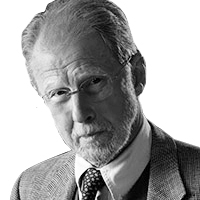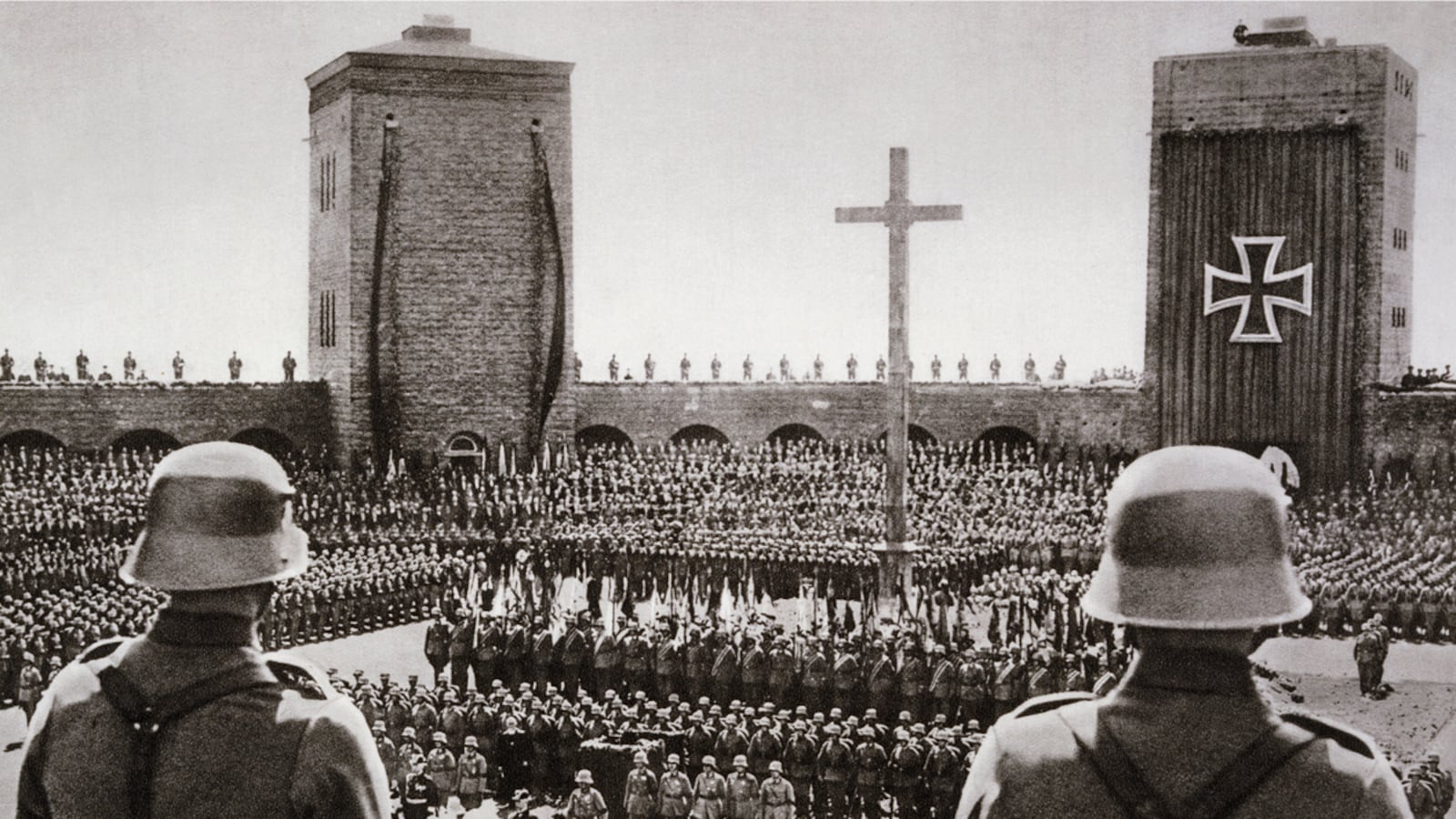“LOVELY SPRING WEATHER BUBONIC PLAGUE RAGING”—Evelyn Waugh: Scoop
There used to be a strong belief that if you wanted to know what was really going on in a country, the best thing to do was to go there and ask a taxi driver. In fact Men at Arms, the first volume of Evelyn Waugh’s fiction trilogy about World War II, begins with the central figure, Guy Crouchback, listening to the opinions of a Fascist taxi driver as he sets out from his house in Italy to return home to England on the eve of war in the summer of 1939, to take up arms in the war that has not yet begun. “War is foolishness,” the taxi driver says. “You will see. Everything will be brought to an arrangement.” When Crouchback dines the next day in London with his fatuous brother-in-law Arthur Box-Bender, a Member of Parliament, and tells him what the taxi driver said, Box-Bender replies, “Of course. Always go to a taxi-driver when you want a sane, independent opinion.”
This is probably not as widely held a point of view as it used to be, now that most taxi drivers are foreigners who seldom speak the language of the country they are living in, or have any interest or stake in its politics, and people have generally switched to print journalists, television talk show hosts and television and radio news “commentators” when in search of what is going on. Of course most of these people are now either ideologically fixated or frozen as tightly as the stick inside a Good Humor bar to a single point of view (think Rush Limbaugh or Glen Beck), or simply present the news as they think their employer wants it to be presented, so perhaps one might be better off with a taxi driver—at least his opinions are likely to be his own, however odd, and you are paying him.
Reading Andrew Nagorski’s Hitlerland, one is struck by the fact that with the exception of the rare starry-eyed pro-Nazi journalist, most American reporters went through the same stages of initial qualified admiration for the new Nazi regime’s imposition of social order and huge public works programs to various levels of dismay and horror at what lay behind it all, only rather more quickly than their readers or the United States government did. If Americans were slow to realize the horror of Nazism, it was not for want of warnings, though they, like everybody else, reacted to them perhaps a little late. The most notable exception was William L. Shirer, of CBS, the author of Berlin Diary and The Rise and Fall of the Third Reich, who seems to have intuited from the very beginning of his arrival in Europe that Hitler’s was the face of evil, and whose boss, William Paley, the CEO and founder of CBS, perhaps because he was Jewish, did not get in the way of his own correspondent, unlike many newspaper proprietors of the period. Since I worked with Bill Shirer at S&S towards the end of his life, I can report that his greatest regret was that people did not pay more attention to what he was reporting very accurately from 1934 to 1941, or respect him for what he had written until after Pearl Harbor, when it was too late: history, by then, instead of news.
With the exception of Shirer, I must confess that I feel, like most Britons of a certain age, some degree of impatience with the increasingly high moral tone of American reaction to Nazi Germany throughout the Thirties, since Britain and France were being urged by Americans to confront Germany at every crisis without any assurance that the United States would be there to help them with the fighting, if it came to that. And when it did come to that of course, Britain and France indeed had to fight Nazi Germany by themselves from September 1939 to June 1940 (except for the gallant Poles, who were quickly overrun), just as the “appeasers” had always predicted and feared. Britain then fought Germany alone after the French surrender, from June 1940 to December 1941, without any sign that America would ever enter the war. It is galling to be told that we should have fought Germany over the remilitarization of the Rhineland in 1936, or the Anschluss or the Czech crisis in 1938, by people who had no intention of joining in the fighting. The American position towards Hitler was that of a man watching the beginning of a bar room brawl and telling the British and the French, “You guys hit him, and I’ll hold your coats,” until the Japanese foolishly brought America into the war on December 7th 1941.

Reading the stories that American journalists cabled home on Hitler, the beginnings and growth of the Nazi Party and, once Hitler had come to power, the Third Reich, all of which Nagorski ably summarizes in a book one is struck by the fact that many American reporters got the story more or less right from the very start. This is partly because the awful, rowdy brutality and xenophobia of Nazism was too unmistakable to be missed, an endless, brutal, loathsome parade of crashing boots, massed bands, and swastika banners, a phenomenon that was from the first designed to silence dissent, and partly because Hitler’s message of hatred against Jews and revenge for the German defeat of 1918 was seldom modulated or disguised, and impossible for anybody but the most credulous of reporters to ignore or mistake. You did not need to read Mein Kampf to know what the Führer thought, he said it over and over again, both in public and in rare private interviews, though for Americans he cunningly tended to point out the strict American immigration laws as an example Germany should follow when discussing the “Jewish question,” an example of how astutely the Germans managed their press relations with American reporters.
A major (and fascinating) character in Nagorski’s book is Ernst Sedgwick “Putzi” Hanfstaengl, the half-American, Harvard-educated early promoter and self-appointed public relations adviser of Hitler, an enormous, powerfully built and spasmodically charming man, whose specialty, apart from a gift for piano playing and for charming young women, was “explaining” Hitler to American journalists in language they understood. Putzi, like several others who were close to Hitler, eventually came to realize that the monster he had helped to create was no longer in his or anybody else’s control, and as a reasonable man frightened by what lay in store, he made a successful escape to the United States, after coming to the possibly erroneous conclusion that he was going to be murdered by the more odious thugs around the Führer on a faked mission to Spain, and perhaps also because he was denounced by Unity Mitford as being insufficiently loyal or respectful to Hitler when talking to foreigners.
Putzi had an intense sense of personal survival, and also a sense of humor, both of them dangerous attributes in the circle around Hitler. Although for a time he was a true believer, perhaps his years at Harvard had given him a partial inoculation, unlike Unity Mitford, against what the historian Hugh Trevor-Roper described with acid British precision as the “bestial Nordic nonsense” that passed for politics in 20th Century Germany.
Putzi’s transformation from the man who introduced Hitler to the wealthy Aryan haut monde of Munich and attempted to give him social tips and advice about clothing into a gigantic, swashbuckling figure in a Stormtrooper officer’s brown uniform is one of the best stories in a book that is full of good ones, and makes one sad that unlike poor Unity, Putzi never got what was coming to him, though photographs of him in later life show a face ravaged by guilt or doubt, or both.
Nagorski is quite right when he points out that Germany was never an isolated country, or one that was difficult to get into—indeed tourism flourished, and visits from journalists and celebrities of one kind and another were frequent. The regime had its secrets of course, the existence of Eva Braun was one of them, but anti-Semitism and persecution of the Jews was not—it was public policy, and one of the most strident messages of the Nazi Party.

Nagorski’s cast of characters is not limited to journalists—he includes diplomats, especially the hapless U. S. Ambassador William Dodd, and his wild daughter Martha (subjects of a recent bestseller In The Garden of the Beasts by Erik Larson), who seemed to determined to sleep with foreigners of every political persuasion and who eventually became a Soviet spy, the every fascinating and intelligent George Kennan, a man who seems to have had a preternatural ability to be in the tight place at the right time, and draw the right conclusion, as well as authors, Olympic athletes and many others, who brought or sent home collectively a picture of Nazi Germany that was very seldom positive.
He ends this riveting book—one which would come as a very good introduction to the subject of Nazi Germany to those too young to have read Bill Shirer’s book—with the round-up of German diplomats and journalists in the United States, after America entered the war, and the internment of their American equivalents in Germany. It is interesting that the Germans were sent to luxurious internment at the Greenbriers, in White Sulphur Springs, West Virginia, pending repatriation, whereas the Americans were detained less comfortably in Bad Nauheim, something I never knew, but then this is a book that is full of things I never knew, and I found all of them interesting. It should be on everybody’s “must read” list who is interested in history.






